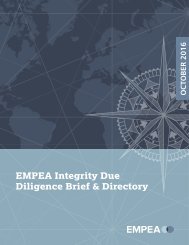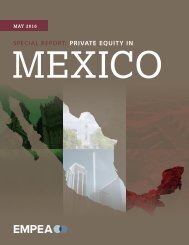Create successful ePaper yourself
Turn your PDF publications into a flip-book with our unique Google optimized e-Paper software.
Open Government<br />
The World Justice Project<br />
http://worldjusticeproject.org/sites/default/<br />
files/files/wjp_rule_<strong>of</strong>_law_index_2014_<br />
report.pdf<br />
R 2 = 0.055 Country Based Public Sector Influence = High Private Sector Influence = Low<br />
Open Government is one <strong>of</strong> nine indices created by the World Justice Project for the Rule <strong>of</strong> Law Index: Limited government powers; Absence <strong>of</strong><br />
corruption; Order and security; Fundamental rights; Open government; Regulatory enforcement; Civil justice; Criminal justice and Informal justice.<br />
Open Government measures the extent to which laws are stable, publicised and accessible, <strong>of</strong>ficial information is available on request as well as<br />
public participation and the right to petition the government.<br />
Political Risk Index<br />
Exclusive Analysis Ltd<br />
http://www.exclusive-analysis.com/ (not<br />
available online)<br />
R 2 = 0.144 Country Based Public Sector Influence = Medium Private Sector Influence = Low<br />
This index based on analyses and forecasts assigning scores to individual countries according to a number <strong>of</strong> variables ranging from internal stability<br />
to external threats. The scores are therefore subjective as they are based on analysts’ assessments; however the significant number <strong>of</strong> analysts<br />
involved as well as their geographically diverse locations means that any negative or positive bias towards a country is greatly reduced.<br />
Projected City Economic Growth<br />
McKinsey Global Institute<br />
http://www.foreignpolicy.com/<br />
articles/2012/08/13/the_most_dynamic_<br />
cities_<strong>of</strong>_2025<br />
R 2 = 0.116 City Based Public Sector Influence = Low Private Sector Influence = Low<br />
This factor estimates 75 ‘urban agglomerations’ economic growth rates in 2025. Higher economic growth implies more investment opportunities,<br />
return on capital, wealth creation and better long term prospects overall.<br />
Wage Comparison Index<br />
UBS<br />
http://www.ubs.com/1/e/<br />
wealthmanagement/wealth_management_<br />
research/prices_earnings.html<br />
R 2 = 0.116 City Based Public Sector Influence = High Private Sector Influence = Medium<br />
This index compares the earnings <strong>of</strong> workers in 71 cities. It provides a gross wage comparison and a net wage comparison, using New York as the<br />
base city (value <strong>of</strong> 100). The index covers 14 occupations that represent a cross section <strong>of</strong> the work force in the industrial and service sectors. It is<br />
based on questionnaires sent to a number <strong>of</strong> companies in the relevant sector for each city that take into account age, personal status, education<br />
and length <strong>of</strong> employment. The index measures annual gross income including pr<strong>of</strong>it sharing, bonuses, holiday pay, additional months’ salaries<br />
payments and family allowances measured in US dollars. There is also classification <strong>of</strong> net income, i.e., gross income after taxes and social security<br />
contributions.<br />
Tax as Percentage <strong>of</strong> GDP<br />
The World Bank<br />
http://data.worldbank.org/indicator/<br />
GC.TAX.TOTL.GD.ZS<br />
R 2 = 0.135 Country Based Public Sector Influence = High Private Sector Influence = Low<br />
Tax revenue refers to mandatory transfers to the central government for public purposes. Certain transfers such as penalties, fines, and most social<br />
security contributions are excluded. Refunds and corrections <strong>of</strong> erroneously collected tax revenue are treated as negative revenue. These statistics<br />
provide an insight not just <strong>of</strong> the overall tax burden carried by individuals and businesses, but also <strong>of</strong> its importance for the relevant country as a share<br />
<strong>of</strong> its GDP.<br />
Ease <strong>of</strong> Doing Business Index<br />
The World Bank<br />
http://www.doingbusiness.org/customquery<br />
R 2 = 0.081 Country Based Public Sector Influence = High Private Sector Influence = Medium<br />
The ease <strong>of</strong> doing business index is designed as a measure <strong>of</strong> regulations that directly affect running a business rather than more general conditions<br />
like infrastructure, macroeconomic conditions or a country’s closeness to large markets. It ranks economies on the simple average <strong>of</strong> country<br />
percentile rankings on 10 topics including starting a business, dealing with licences, employing workers, registering property, getting credit, paying<br />
taxes and enforcing contracts.<br />
Regulatory Enforcement<br />
The World Justice Project<br />
http://worldjusticeproject.org/sites/default/<br />
files/files/wjp_rule_<strong>of</strong>_law_index_2014_<br />
report.pdf<br />
R 2 = 0.072 Country Based Public Sector Influence = High Private Sector Influence = Low<br />
Regulatory Enforcement measures the extent to which government regulations are effectively applied and enforced without improper influence,<br />
due process is respected in administrative proceedings and they are conducted without unreasonable delay, and whether the government does not<br />
expropriate without adequate compensation.<br />
<strong>Conduits</strong> <strong>of</strong> <strong>Capital</strong> – Onshore Financial Centres and Their Relevance to African Private Equity<br />
| 143





